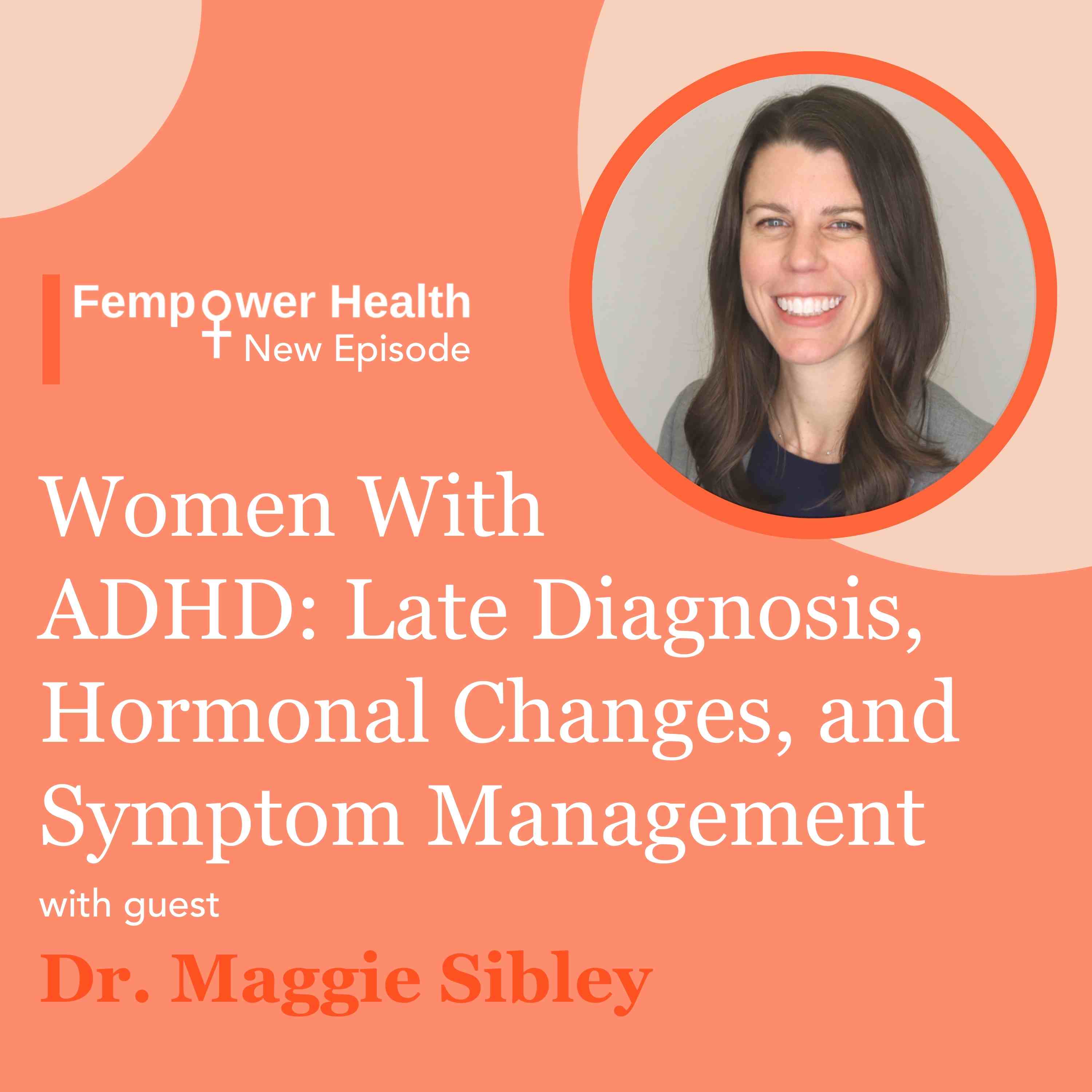Apr 15 2024 42 mins 2
Dr. Maggie Sibley explains the often-misunderstood reality of women with ADHD, from evaluation and treatment to symptom management and hormonal changes.
Episode Summary
In this fascinating episode of Fempower Health, Georgie Kovacs is joined by Dr. Maggie Sibley, a renowned women’s ADHD specialist and researcher. As a clinical psychologist and professor of psychiatry at the University of Washington School of Medicine, Dr. Sibley shares her research-based knowledge and unique perspective on the often overlooked and misunderstood topic of ADHD in adult women.
Listen as we discuss the complexities of ADHD beyond childhood, the relationship between ADHD and hormones in women with attention disorders, and practical strategies for managing ADHD symptoms across different life stages.
Key Discussion Points:
- Common misconceptions about ADHD being a children’s condition and the reality of how symptoms persist into adulthood.
- Research on the trajectory of ADHD from adolescence to adulthood and why it’s so important to recognize ADHD in adults.
- How ADHD symptoms in women manifest differently than men, including internalized symptoms like inattention and executive dysfunction.
- Connections between societal expectations of women and why ADHD often goes undiagnosed in women until later in life.
- How women’s hormonal changes impact regions in the brain that are associated with attention-deficit/hyperactivity disorder.
- Ways to treat and manage adult ADHD, including lifestyle modifications, medication, cognitive behavioral therapy, and personal coping strategies.
- The importance of structure, routine, exercise, and healthy diet for effective ADHD symptom management.
- Tips for navigating the healthcare system during the evaluation stage and treatment plans after diagnosis to ensure specialized care for women with ADHD.
- The importance of community support and further research for women with ADHD.
“Estrogen interacts with dopamine in the brain, which can significantly impact ADHD symptoms, especially during hormonal transitions like perimenopause.” - Dr. Margaret Sibley
Related to this episode:
- Resources on Mental Health
- Related episode: Living With ADHD: Your Brain’s Not Broken
- Learn more about Dr Margaret Sibley
- CHADD (Children and Adults with Attention-Deficit/Hyperactivity Disorder): This is the major advocacy organization for ADHD, providing support, resources, and community connections for both children and adults.
- ADDA (Attention Deficit Disorder Association): This organization focuses on the adult ADHD community, offering tools, resources, and networking opportunities for adults dealing with ADHD.
- Psychology Today: A resource for finding therapists who specialize in ADHD and other psychological conditions. Dr. Sibley recommends using their therapist finder tool to locate experts who specialize in cognitive behavioral approaches and other treatments for ADHD.
If you're passionate about advancing women's health, there are many ways you can support the Fempower Health Podcast. Here's how:
- Subscribe and Listen: Tune in to new episodes every Tuesday by subscribing to the Fempower Health Podcast on iTunes or Spotify or your favorite podcast platform. Your regular listenership is invaluable!
- Leave a Review: Help us grow by leaving a review on iTunes or Spotify. Your feedback not only supports us but also helps others discover our podcast.
- Share with Others: Spread the word by sharing episodes with friends, family, or anyone interested in women's health. Every share helps!
- Engage with Our Community: Follow us on Instagram, Facebook, and Twitter for the latest updates and engaging content.
- Stay Informed: Sign up for our weekly newsletter to receive the latest announcements, news, and research directly in your inbox.
- Reach Out: We love hearing from you! Reach out for inquiries, outreach, or even to share your questions and topics of interest.
Together, let's build a stronger community dedicated to women's health. Your support is crucial in this journey!
Guest Bio
Dr. Margaret Sibley is a Professor of Psychiatry and Behavioral Sciences at the University of Washington School of Medicine and a clinical psychologist at Seattle Children’s Hospital. She has authored over 120 scholarly publications on ADHD in adolescence and adulthood with research funded by the National Institute of Mental Health and the Institute of Education Sciences. She is Secretary of the American Professional Society for ADHD and Related Disorders (APSARD), a Professional Advisory Board Member for Children and Adults with Attention Deficit Hyperactivity Disorder (CHADD), and an Associate Editor of the Journal of Attention Disorders. She is the author of Parent-Teen Therapy for Executive Function Deficits and ADHD: Building Skills and Motivation published by Guilford Press in 2017.
**The information shared by Fempower Health is not medical advice but for informational purposes to enable you to have more effective conversations with your doctor. Always talk to your doctor before making health-related decisions. Additionally, the views expressed by the Fempower Health podcast guests are their own and their appearance on the program does not imply an endorsement of them or any entity they represent.**
**Contains affiliate links and I will be compensated if you make a purchase after clicking on my links**
